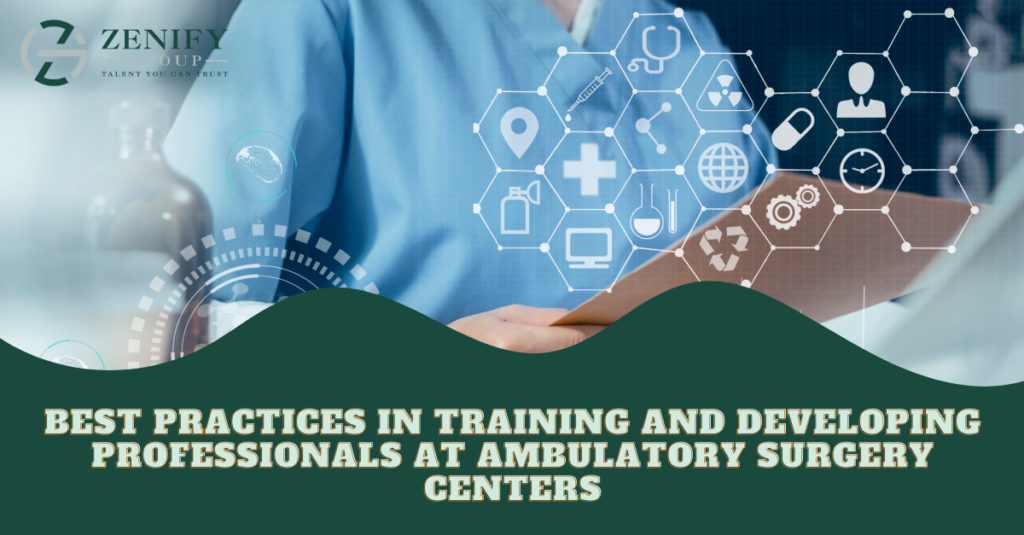
Ambulatory surgery centers (ASCs) provide high-quality care to patients, while also providing a convenient, cost-effective alternative to hospital-based surgeries. As such, it is important for ASCs to ensure their staff are properly trained and developed so they can deliver the best possible patient experiences. Here, we will discuss some of the best practices for training and developing professionals at Ambulatory Surgery Centers.
Establish Clear Goals
The first step in any training and development program should be to establish clear goals for both individuals and the facility as a whole. This will help ensure everyone is working towards the same objectives, and that everyone understands their roles and responsibilities. It will also help identify potential areas of improvement where more training or support may be needed.
Measure Current Levels of Knowledge
Once goals have been established, it’s important to measure current levels of knowledge so that an appropriate level of training can be provided. This can include assessing technical skills as well as broader competencies such as communication, team working, or problem-solving skills. Assessments should be regularly evaluated to ensure they remain up-to-date with industry standards and trends.
Focus on Quality over Quantity
It is important not to forget that quality always trumps quantity when it comes to training programs at Ambulatory Surgery Centers—the aim should always be to provide staff with relevant information which they can put into practice in their daily work lives. To this end, courses should focus on the core concepts and ideas rather than offering too much detail which could become overwhelming for staff members trying to absorb new information quickly.
Emphasize Soft Skills Along With Technical Abilities
Technical abilities are obviously essential for many roles within ASCs but soft skills can also play an important role in helping facilities run smoothly – from communication skills necessary between departments and employees to time management techniques which can help individuals work more efficiently together with team day-to-day tasks successfully completed quickly and effectively. While hard skills require practice in order for employees to master them fully, soft skills often require more interactive sessions such as workshops or group discussions where topics can be explored in greater depth.
Utilize Technology Where Appropriate

Technology has come a long way over recent years, making it easier than ever before for institutions including ambulatory surgery centers to provide effective learning opportunities. For example, e-learning courses are now widely available which enable learners to study at their own pace with minimal supervision while still being monitored by instructors who can review progress remotely. Additionally, virtual reality technologies are increasingly being used across industries classroom trainers simulate scenarios that could occur during normal operations – thus enabling staff members to gain a better understanding of how they must act while on duty.
Provide Ongoing Training & Support
Finally, it is important that ongoing training & support is offered even after initial workshops or courses have been completed. Regular meetings or seminars can help keep staff informed about new developments in the field as well as any changes relating directly or indirectly to particular procedures being carried out by your center. Offering access to online resources will further elevate your employees ‘ ability to stay abreast of current trends & protocols – allowing them to make informed decisions when necessary.
Orientation
A comprehensive orientation program is critical for successful onboarding at an ASC. The program should cover topics such as infection control, employee safety protocols, patient rights, HIPAA requirements, fire safety, OSHA compliance, hazardous waste management, and privacy practices. Orientation should also include a review of policies and procedures specific to the facility as well as instructions on how to use specialized equipment or software programs used by ASCs.
Continuing Education
Continuing education is essential for healthcare professionals working in ASCs. Professionals should participate in accredited continuing education programs to help them stay current with any changes in regulations or standards of care. Online courses or modules can provide conveniently accessible professional development opportunities that fit into a busy schedule without having to take time away from work responsibilities. In addition to traditional classes or seminars, staff members can be encouraged to attend webinars, read key articles within their specialty areas, or participate in joint research initiatives with colleagues or professional organizations.
Mentorship Programs

Mentorship programs are important for providing support and guidance to new hires or those looking for career advancement within their profession. A mentoring relationship between an experienced mentor and a newer employee allows the two individuals to share knowledge and experiences that can help improve job performance within the ASC setting. Furthermore, mentorship can provide additional motivation for staff members by fostering a greater sense of team unity among medical personnel at the facility as they strive towards common goals while helping each other grow professionally
By implementing these best practices into your facility’s training program, professionals at Ambulatory Surgery Centers will be equipped with the knowledge & expertise necessary to meet high industry standards – allowing them to deliver high-quality patient care with confidence .
Frequently Asked Questions
1. Why is training and development important for professionals at ambulatory surgery centers?
Training and development programs help ensure that employees have the necessary skills and knowledge to provide quality care to patients. They also help employees stay engaged in their work and committed to the organization’s goals, which can lead to higher employee retention rates.
2. What are the types of training and development programs available for professionals at ambulatory surgery centers?
The most common types of training and development programs include on-the-job training, external courses, and internal courses developed by ASC management teams.
3. What should be included in a training and development plan?
A comprehensive training and development plan should include goals and objectives for each position within the organization, as well as a process for evaluating different approaches and methods of training.
4. How can professional development programs be developed within budget constraints?
Setting clear goals for professional development programs and focusing on specific areas of improvement can help ensure that resources are used effectively. Additionally, leveraging available internal resources and utilizing low-cost or free external resources like webinars or online courses can help reduce costs.
5. What are the different types of training delivery methods?
The three main types of training delivery are classroom, virtual, and e-learning.
6. Why is evaluation of training and development programs important?
Evaluating training and development programs can help determine their effectiveness and impact on organizational goals and objectives. It also helps ensure that resources are being used effectively and efficiently.
7. What types of resources can be used for training and development programs?
Resources for training and development programs can include classroom training, on-the-job training, self-directed learning, and external courses or seminars. It’s important to assess suitability and develop a plan for using these resources effectively.
8. What should be included in training and development policies and procedures?
Training and development policies and procedures should address who is eligible for training, what types of training are required, and how much time off can be taken for training. Additional resources like mentoring programs or career counseling services can also be included.
9. What is professional credentialing and why is it important?
Professional credentialing is the process of evaluating a professional’s qualifications, education, and experience to determine if they meet established standards. It’s important for ensuring that professionals are qualified and competent to perform their duties in the ASC setting.
10. What is continuing education and why is it important?
Continuing education is any educational activity that contributes to the professional development of a healthcare provider. It’s important for maintaining or improving professional competence and staying up-to-date with the latest developments in the field.

